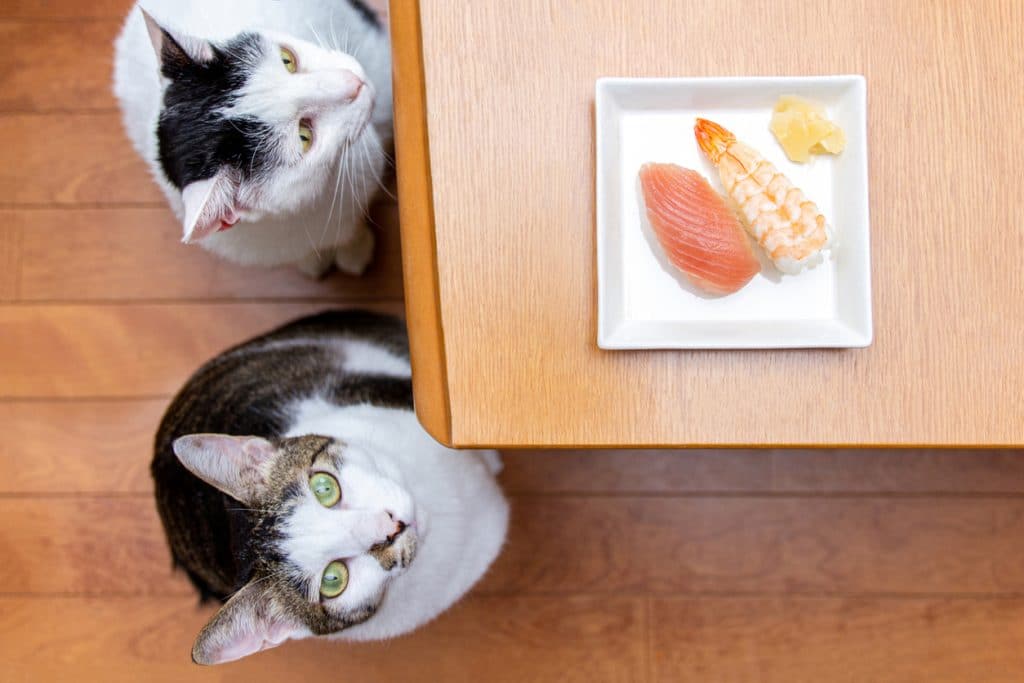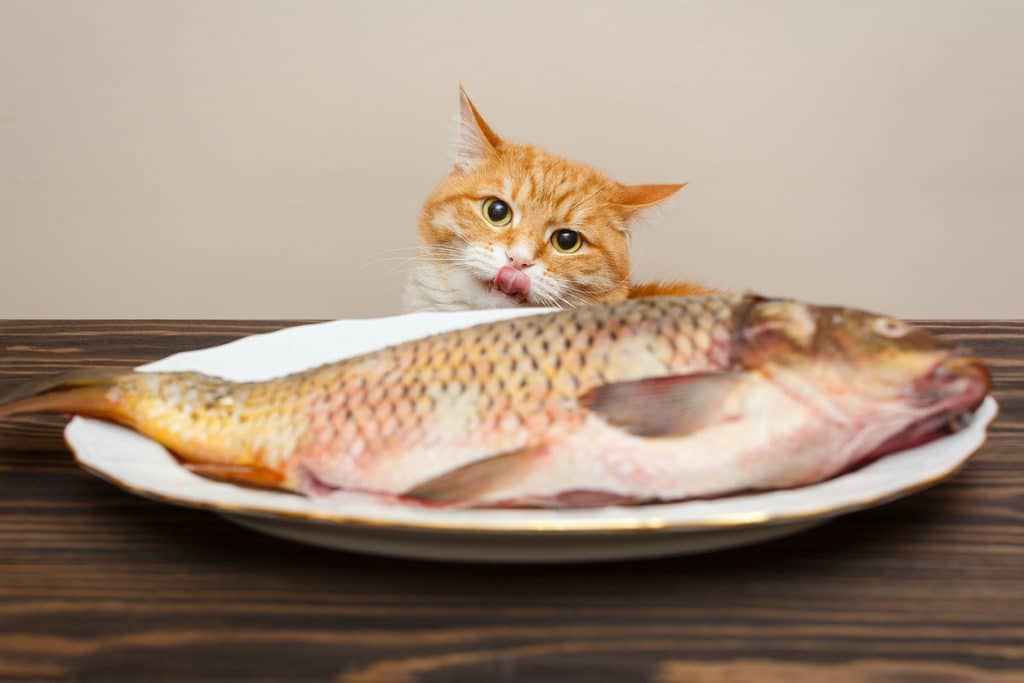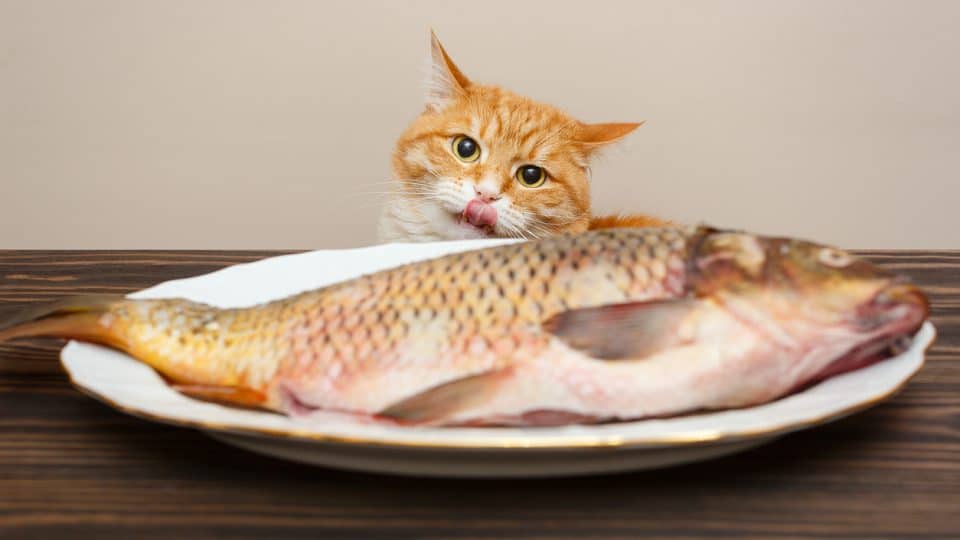We’re all familiar with the image of a wily housecat eyeballing the family goldfish. Cats and fish seem as natural a pairing as, say, peanut butter and jam. Not only do cats like eating fish, but they also delight in smelling and watching them. But as former desert creatures who typically detest the water—why do cats like fish so much? And is fish for cats safe, nutrition-wise?
Cats like eating fish for two main reasons: 1.) they’re loaded with nutrients, and 2.) they smell and taste good! While it’s not a natural part of the domestic cat’s diet, cooked fish can make a delicious and nutritious treat from time to time—that is, if your cat likes it. Not all cats do! And some cats are even allergic to fish.
Before you share your catch of the day, here’s what you need to know about feeding cats fish.
Why Do Cats Like to Eat Fish?

iStock/Lubo Ivanko
Domestic cats descended from African wildcats, who were unlikely to have fish on the menu. And aside from a few water-loving breeds like Maine Coons, Abyssinians, and Bengals, most cats aren’t keen swimmers. So, what’s behind your cat’s appetite for fish?
One theory claims that cats acquired a taste for seafood when Ancient Egyptians used fish to lure them into their communities. This theory is unproven, however, so we turned to the experts. With guidance from Dr. Danielle (“Elly”) Page, a Raleigh-based vet with a background in pet nutrition and the founder of AnimKy.com, we discovered the following reasons why cats like to eat fish:
- Cats are opportunistic eaters. After years of living alongside humans, cats learned it’s much easier to eat what’s in front of them (i.e. table scraps and leftovers) than to hunt for something else. If fish is readily available, a cat will usually be happy to eat it.
- They like the smell of fish. Fish smells, well, fishy. Which might be off-putting to us humans, but is downright divine to your cat’s powerful nostrils. One whiff and they are ready to chow down.
- Cats have sensitive taste receptors. An enhanced sense of taste helps cats identify foods rich in essential amino acids like taurine (important for eyesight, digestion, and heart health).
- Fish is rich in protein. Cats are obligate carnivores, meaning they need protein for survival. With their heightened senses of taste and smell, cats can easily identify fish as a protein heavyweight.
- It boosts palatability. Fish keeps mealtime interesting by introducing variety to your cat’s diet. When served as a flavour-enhancing food topper, it can motivate underweight kitties or finicky eaters to eat.
Benefits of Fish for Cats
As an occasional treat, Dr. Page confirms that plain, cooked fish is perfectly safe for cats—the key word being “occasional.” Since a fish-only diet will result in nutritional deficiencies, she recommends incorporating a small amount on top of their regular diet to reap the following benefits:
First, fish is packed with lean protein—good news for our carnivorous friends. Plus, fish is an excellent source of omega fatty acids, Dr. Page tells us. “If you are choosing cold water fish varieties such as salmon, there can be the added benefit of omega-3 fatty acids that help improve joint health and coat health.” The highest levels of omega fatty acids can be found in oily fish such as salmon, sardines, and mackerel.
A fish oil supplement may be worth considering for cats who aren’t crazy about fish. While the benefits of fish oil for cats have yet to be thoroughly researched, there is evidence that a supplement can reduce inflammation. Dr. Page advises pet owners to choose a high-quality supplement designed specifically for cats (no sharing your human-grade tablets!) and to administer the proper dose.
Fish also contains taurine, an amino acid essential for good eyesight, heart health, and digestion. Unlike other mammals, cats can’t produce taurine on their own, making it necessary to obtain it from food sources like fish.
Should you favour one type of fish over another? As Dr. Page puts it—it depends on the benefits you’re looking for. “Salmon is a great source of EPA and DHA (the main two omega-3s that have beneficial properties.) But salmon is also high in fat and calories, whereas white fish tend to be lower in fat and calories and can be better for pudgy cats.”
Can Cats Eat Raw Fish?

iStock/SetsukoN
They may be carnivores, but can cats eat raw fish? According to Dr. Rebecca Greenstein, Chief Veterinarian at Kleinburg Veterinary Hospital and Veterinary Medical Advisor for Rover, cats should NOT eat raw fish. She points out, “there is officially no scientific proof that demonstrates feeding raw has any benefits or is superior to traditional diets, and in fact, the only peer-reviewed research out there shows the risks.”
One such risk is food poisoning from bacteria like Salmonella and E. coli. Parasites like tapeworms can also be transmitted through raw fish consumption.
What’s more, raw fish contains thiaminase. This enzyme breaks down thiamine in the body, leading to a deficiency of this important B vitamin. Symptoms of a thiamine deficiency include:
- Head tremors
- Loss of coordination
- Depression
- Ventroflexion of the head (head and neck are dropped down)
- Seizures
Left untreated, severe thiamine deficiency can even lead to death, so you may be asking yourself whether feeding your cat raw fish is worth the risk.
How to Cook Fish For My Cats
Since raw is out, one of the simplest options is serving pre-packaged fish-based treats made just for cats. You can find fishy meal toppers designed to complement your cat’s diet, creamy fish purees, and crunchy tuna bites, to name a few.
Speaking of tuna, the tin can variety is a suitable snack for your kitty—in limited amounts. Canned tuna intended for humans contains high levels of mercury while contributing little heart-healthy taurine, so it’s best served as a “sometimes” snack. Opt for light tuna packed in water, not oil, and avoid any flavourings or added salt.
As for cooking fish for your cat, boiled, grilled, or roasted is best. Avoid fried and smoked fish, be careful to remove bones, and skip your usual seasonings. As a safety precaution, it’s always smart to check with your vet before adding to or changing your cat’s normal diet.
What Kind Of Fish Do Cats Like The Most?

iStock/Okssi68
Every cat has her preferences, but the fish cat like most include:
- Tuna
- Salmon
- Sardines
- Halibut
- Tilapia
- Cod
- Flounder
Cats tend to love tuna and salmon for their strong smell and robust flavour. Sardines are another feline favourite, popular for their high-fat content.
Can Cats Be Allergic To Fish?
Unfortunately, yes; cats can be allergic to fish. But what causes a fish allergy—and how can you identify one?
Dr. Jamie Whittenburg, Veterinarian and Director of Kingsgate Animal Hospital in Lubbock, Texas, broke it down for us: “Like with humans, we know the “how” behind food allergies, but not the “why.” Why some cats may develop an allergy to fish is unknown, although it is suspected there may be a genetic predisposition. As for the how, food allergies are an abnormal reaction of the immune system to an antigen within the food. The allergen is almost always a protein.”
Dr. Whittenburg laid out these signs to watch for:
- Red, inflamed skin, most commonly located on their chest and abdomen
- Itchiness
- Constant licking of affected areas
- Hair loss
- Bleeding
While less common, some cats will also experience vomiting, stomach pain, and diarrhoea.
“It can be very hard to work out if your cat is suffering from a food allergy, environmental allergy, or a flea allergy as they can all show the same symptoms,” Dr. Danielle Page explains. “You will need to take your cat to a veterinarian who will run some diagnostics.”
The gold standard for diagnosing food allergies is conducting a diet trial to see if symptoms improve. Dr. Whittenburg explained this can be approached in two ways: you can feed your cat a novel protein, like duck, rabbit, kangaroo, or venison. Or your vet may recommend a hydrolysed diet where the protein is broken down into tiny pieces unrecognisable to your cat’s immune system. Both diets are available with a vet’s prescription.
In terms of treatment, it’s worth noting that food allergies and environmental allergies are approached differently.
“The only treatment for a fish allergy is a diet that does not contain fish—it is usually that simple,” Dr. Page observes. “If a cat is suffering from environmental allergies (or food and environmental) then it is an entirely different story,” she adds. Treatments for environmental allergies include:
- A diet rich in omega-3 fatty acids
- Omega-3 fatty acid supplementation
- Corticosteroids
- Immunotherapy
- Immunosuppressive drugs
- Antihistamines
Takeaway: All Things In Moderation
Dishing up cooked fish or a scoop of canned tuna is a nice way to treat your cat—as long as it doesn’t replace her regular diet. Too much tuna can even lead to mercury poisoning in cats. But when offered in moderation, fish complements a balanced feline diet. And don’t forget about other “human foods” your cat may like, including properly prepared chicken, eggs, and even small amounts of hydrating watermelon.
One final word of advice: always get the all-clear from your vet before making any changes to your cat’s diet.





